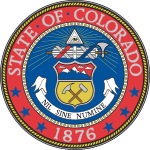
In the United States Electoral College, a faithless elector is an elector who does not vote for the candidates for U.S. President and U.S. Vice President for whom the elector had pledged to vote, and instead votes for another person for one or both offices or abstains from voting. As part of United States presidential elections, each state legislates the method by which its electors are to be selected. Many states require electors to have pledged to vote for the candidates of their party if appointed. The consequences of an elector voting in a way inconsistent with their pledge vary from state to state.

Alva Blanchard Adams Sr. was an American lawyer and Democratic politician from Pueblo, Colorado. He served nine years as a United States senator from Colorado, serving by appointment from 1923 to 1924, then serving again from 1933 until his death in 1941. He was the first U.S. senator from Colorado who was born in Colorado. He is the namesake of the Alva B. Adams Tunnel under Rocky Mountain National Park.
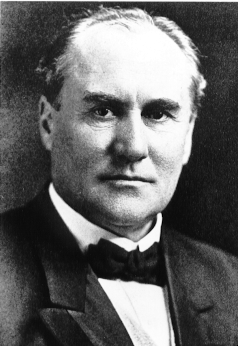
Henry Augustus Buchtel was an American minister, educator, and public official. He was the seventeenth governor of Colorado.

The 1938 United States Senate election in Colorado took place on November 8, 1938. Incumbent Democratic Senator Alva B. Adams ran for re-election to a second term. Adams faced Denver attorney Archibald A. Lee, the Republican nominee, in the general election. Despite the nationwide Republican landslide, including Republicans' landslide victory in the gubernatorial election that year, Adams's popularity translated into an easy re-election campaign. Adams ended up defeating Lee with 58% of the vote. However, Adams did not end up fully serving his second term; he died on December 1, 1941.
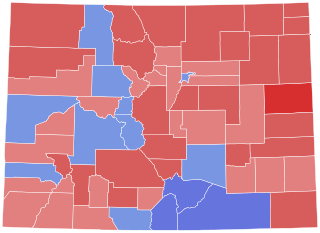
The 1944 United States Senate special election in Colorado took place on November 7, 1944. Incumbent Republican senator Eugene Millikin, who was first appointed to fill Alva B. Adams's seat in 1941 and re-elected at the ensuing special election in 1942, ran for re-election to his first full term. In the general election, he faced wealthy Denver attorney Barney L. Whatley. Millikin benefited from the strong Republican performance in Colorado—Thomas E. Dewey and Governor John C. Vivian both won their respective elections by decisive margins—and cruised to a landslide victory over Whatley.

The 1942 United States Senate special election in Colorado took place on November 3, 1942. Democratic senator Alva B. Adams died in office on December 1, 1941, and Republican Governor Ralph L. Carr appointed Denver oilman Eugene Millikin to fill the vacancy. Millikin ran for election for the remainder of Adams's term. He was opposed in the general election by James A. Marsh, the former chairman of the state Democratic Party. Aided in part by the nationwide Republican landslide, Millikin easily defeated Marsh to serve out the remainder of the term.

The 1920 United States Senate election in Colorado took place on November 2, 1920. Incumbent Democratic Senator Charles S. Thomas initially declined to run for re-election, and State Supreme Court Justice Tully Scott won the Democratic nomination to succeed him, facing off against former Leadville Mayor Samuel D. Nicholson, the Republican nominee. However, in October 1920, Thomas announced that he would run for re-election as the nominee of the National Party. However, Thomas's decision did not ultimately affect the outcome of the election. Aided by Republican presidential nominee Warren G. Harding's strong performance in the state, as well as Republican Governor Oliver Henry Shoup's landslide re-election, Nicholson defeated Tully and Thomas in a landslide. Out of four candidates, Thomas placed fourth, winning just 3% of the vote and finishing behind Farmer–Labor nominee G. F. Stevens.

The 1924 United States Senate special election in Colorado took place on November 4, 1924, to fill the remainder of the term for which Samuel D. Nicholson was elected in 1920. Nicholson died in office on March 24, 1923, and Democratic Governor William Ellery Sweet appointed Alva B. Adams, a prominent Pueblo attorney, to fill the vacancy. Adams, however, declined to be a candidate in the special election, instead challenging incumbent Republican Senator Lawrence C. Phipps in the regular election the same year.

The 1938 Colorado gubernatorial election was held on November 8, 1938. Republican nominee Ralph Lawrence Carr defeated Democratic incumbent Teller Ammons with 59.50% of the vote.

The 1930 Colorado gubernatorial election was held on November 4, 1930. Incumbent Democrat Billy Adams defeated Republican nominee Robert F. Rockwell with 60.41% of the vote.
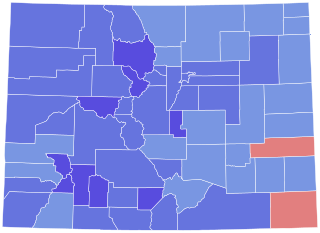
The 1928 Colorado gubernatorial election was held on November 6, 1928. Incumbent Democrat Billy Adams defeated Republican nominee William L. Boatright with 67.05% of the vote.

The 1926 Colorado gubernatorial election was held on November 2, 1926. Democratic nominee Billy Adams defeated Republican nominee Oliver Henry Shoup with 59.84% of the vote.

The 1920 Colorado gubernatorial election was held on November 2, 1920. Incumbent Republican Oliver Henry Shoup defeated Democratic nominee James M. Collins with 59.55% of the vote.
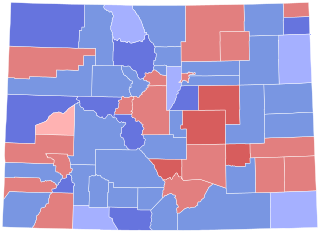
The 1918 Colorado gubernatorial election was held on November 5, 1918. Republican nominee Oliver Henry Shoup defeated Democratic nominee Thomas J. Tynan with 51.15% of the vote.

The 1908 Colorado gubernatorial election was held on November 3, 1908. Democratic nominee John F. Shafroth defeated Republican nominee Jesse Fuller McDonald with 49.41% of the vote.

The 1904 Colorado gubernatorial election was held on November 8, 1904.

The 1896 Colorado gubernatorial election was held on November 3, 1896. Democratic nominee Alva Adams defeated People's Party nominee Morton Shelley Bailey with 46.22% of the vote.

The 1886 Colorado gubernatorial election was held on November 2, 1886. Democratic nominee Alva Adams defeated Republican nominee William H. Meyer with 49.66% of the vote.

The 1884 Colorado gubernatorial election was held on November 4, 1884. Republican nominee Benjamin Harrison Eaton defeated Democratic nominee Alva Adams with 50.74% of the vote.

The 1932 United States Senate elections in Colorado took place on November 8, 1932. Incumbent Republican Senator Charles W. Waterman announced that he would not seek re-election to a second term. Attorney Karl C. Schuyler won the Republican nomination to succeed Waterman and faced former Senator Alva B. Adams, the Democratic nominee, in the general election.

